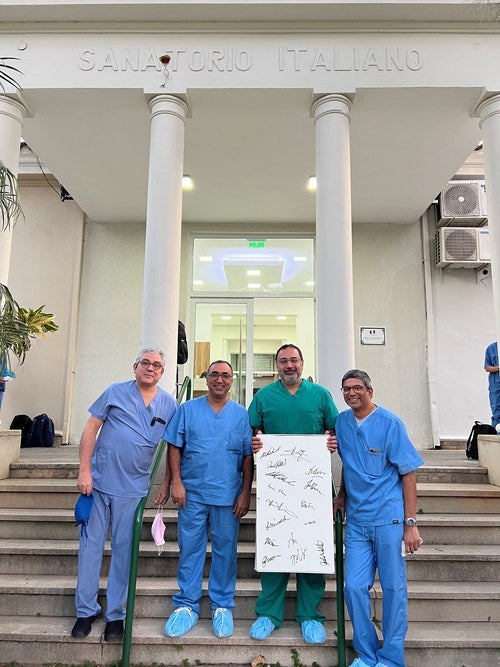
Supira Medical, Inc., a Shifamed portfolio company focused on developing the next-generation solution for mechanical circulatory support, announced today it has initiated its first-in-human clinical study performed by principal investigator, Adrian Ebner, M.D., Head of the Cardiovascular Department at the Italian Hospital Asuncion Paraguay. The prospective, single-arm, single-center study will evaluate the safety and performance of Supira’s low-profile, high-flow percutaneous ventricular assist device (pVAD) to support cardiovascular hemodynamics in patients undergoing high-risk percutaneous coronary interventions (HRPCI).
Additionally, Gagan Singh, M.D., M.S., Director of Clinical Cardiovascular Research at University of California, Davis, Susheel Kodali, M.D., Director of the Structural Heart and Valve Center at New York Presbyterian / Columbia University Medical Center, and Azeem Latib, M.D., Section Head of Interventional Cardiology and Director of Structural Heart Interventions at Montefiore Health Systems were present to observe the first procedures with the Supira System.
“Today marks an important milestone as Supira transitions to a clinical-stage company,” commented Dr. Nitin Salunke, President and CEO of Supira Medical. “I would like to thank Dr. Ebner and the entire clinical team for their seamless execution of these first cases. We are grateful to our clinical advisors, Drs. Singh, Kodali and Latib, for prioritizing this study and traveling to share this initial clinical experience.”
“I am pleased to be a part of the initial cases and remain impressed by the performance of Supira’s pump,” stated Dr. Singh. “Unlike other pVADs, this system has the power to deliver high flow through a small profile. The combination of a low-profile/high-flow system is extremely attractive as we look to address the risks of vascular complications associated with currently available devices.”
Percutaneous ventricular assist devices are used during stent placement or angioplasty to provide mechanical support for high-risk patients with severe coronary artery disease or comorbidities. Additionally, pVADs are used to treat patients suffering from cardiogenic shock (CS), a condition that can occur following a severe heart attack and is associated with a high rate of morbidity as a patient’s heart is suddenly too weak to adequately pump blood to vital organs.
“Achieving high flow rates has typically required larger devices which can be challenging from both an access and positioning perspective,” commented Dr. Kodali. “In my opinion, Supira’s technology was easily placed and performed well. This is a meaningful advancement that will allow more operators to confidently perform HRPCI procedures.”
“Mechanical support is critical for high-risk cases and it is exciting to see this space continue to evolve,” remarked Dr. Latib. “I am impressed with Supira’s technology and I am confident it will be a game-changer for both physicians and patients undergoing high-risk procedures.”
Source: Company Press Release




